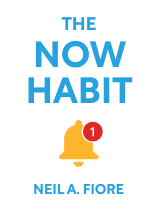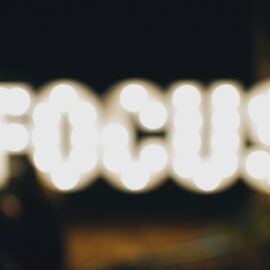

This article is an excerpt from the Shortform book guide to "The Now Habit" by Neil A. Fiore. Shortform has the world's best summaries and analyses of books you should be reading.
Like this article? Sign up for a free trial here.
Are you a chronic procrastinator? How does anxiety feed your procrastination habit by making you dread work?
According to Neil Fiore, the author of The Now Habit, procrastination results from anxiety about work. Once we procrastinate, we typically feel bad and tell ourselves we’re lazy. That negative self-talk creates more anxiety, which, in turn, only makes it harder to get back to work by creating even more pressure.
Here’s how to beat your procrastination habit with positive self-talk.
Positive Self-Talk for Procrastination
One way to change how you think about work in order to beat the procrastination habit is to change your self-talk. Fiore argues that procrastinators typically talk to themselves in “have to” and “should” statements—both of which only build negative feelings that then lead to procrastination. According to Fiore, if you tell yourself you “have to” do something, you make yourself a powerless victim of circumstance because you feel like other people or external circumstances are coercing you to do whatever it is. This causes undue stress, pressure, and resentment.
(Shortform note: One way to overcome “have to” thinking is to focus on intrinsic rather than extrinsic motivation. In Lost Connections, Johann Hari explains that extrinsic motivation means treating an action as a means to an end whereas intrinsic motivation involves enjoying an action for its own sake. For example, extrinsic motivation is running a mile because you’re trying to lose weight. Intrinsic motivation is running a mile because you enjoy running. In the former case, you’re more likely to feel like you “have to” go for a run, whereas in the latter case running is something you choose to do.)
Likewise, if you tell yourself you “should” do something, you make that thing into a moral issue—you’re a bad person if you don’t do it. If you tell yourself that things “should” be different than they are, you start to think that the world is bad and unfair. And if you tell yourself you “should” be more like someone else, you devalue yourself and define yourself as inadequate. In short, Fiore says that “should” statements lead to depression that saps your energy and motivation to work.
| Valid and Invalid “Should” Statements To help identify distorted “should” statements, psychologist David Burns argues that there are only three valid uses of the word “should”: – Legal “shoulds” in situations where an action is forbidden by law. For example, “You shouldn’t speed on the highway because you’ll get a ticket.” – Laws of the universe “shoulds” that express the certainty of an outcome. For example, “If I drop this pen, it should fall on the floor.” – Moral and ethical “shoulds” that name ethically permissible or impermissible behavior. For example, “You shouldn’t steal because it’s wrong.” Obviously, there’s room for interpretation when it comes to ethics, as not everyone shares the same moral code. But most of the time, Burns suggests, we attribute this moral meaning to things that aren’t really moral issues. For this reason, if you find yourself thinking that you “should” or “shouldn’t” do something, Burns suggests interrogating whether the statement meets any of the three categories. If not, he says, it’s distorted thinking. |
The answer to these problems, Fiore says, is to change your self-talk to emphasize choice and agency. In other words, instead of telling yourself you “have to” or “should” do things, tell yourself you “choose to” or “want to” do things. Doing so, Fiore says, removes the unnecessary stress and judgment and puts the emphasis on your wants and your agency.
(Shortform note: Fiore’s suggestion is an example of cognitive reframing, a technique whereby you change your mindset by finding alternative ways of thinking and talking about a situation. The technique is commonly used when treating a wide range of mood disorders, as it typically requires you to look for a more positive or helpful spin on a situation.)

———End of Preview———
Like what you just read? Read the rest of the world's best book summary and analysis of Neil A. Fiore's "The Now Habit" at Shortform.
Here's what you'll find in our full The Now Habit summary:
- Why people tend to put off the things that matter the most
- Where procrastination stems from, and why it doesn't mean you're lazy
- How to get more done while still maintaining a balanced life






